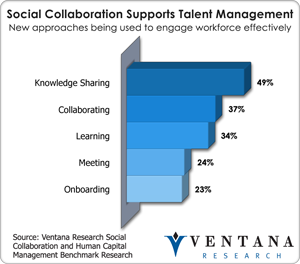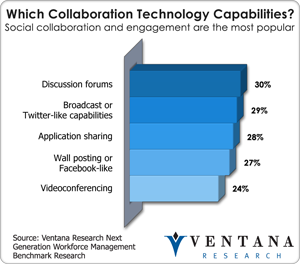Learning management software (LMS) has evolved over the past 25-plus years from a classroom scheduling tool that helped streamline instructor-led and classroom training to a rich, integrated enterprise application that delivers and tracks training across an entire organization. These applications are effective at enabling organizations to share knowledge and track the knowledge-sharing process. Typically they use a top-down model involving classic instructor-led training and online courseware. This model works well for uses such as compliance tracking for a wide variety of industries, training related to employee performance gaps, sales training for product knowledge and training external dealer networks on products and services, to name a couple. In these as well as other areas, classic learning management systems have grown to be a crucial human capital business process, and one that that provides demonstrable business and economic value to many organizations around the globe.
In recent years, though, the social revolution that has swept the enterprise application market has changed the way organizations look at the learning process, shifting the focus away from that classic top down model to collaborative, peer-to-peer knowledge sharing. This has important implications for how learning will be conducted across the organization. Today, learning management integrates with the broader universe of human capital management (HCM), an area that spans talent management, workforce management, human resources management and payroll. As these broad platforms evolve, each application within them becomes part of a unified system. Multiple software providers offer different options, from single stand-alone learning systems to ones that are part of a unified talent management platform, where learning management empowers strategic leadership development and employee engagement initiatives to support HCM across the enterprise or within a line of business.
However, that social revolution has now brought us to a tipping point. Employees increasingly think of every application they touch in terms of social interaction, and this includes their learning management system and processes. Even for older employees, this increasing interest in social-enabled applications is evident – consider a June 2012 report from the Pew Internet & American Life Project that reported that the number of older adults (65 and older) signing up and using Facebook increased 150 percent from 2009 to 2011.
Even with such strong adoption in all segments of the workforce,  though, most organizations still report very poor ability to engage their employees with the social tools they have. Our benchmark research on social collaboration and human capital management shows that 50 percent of organizations do not manage informal social collaboration and learning well. In the same research we found that knowledge-sharing (49%), collaborating (37%) and learning (34%) were the top three ways in
though, most organizations still report very poor ability to engage their employees with the social tools they have. Our benchmark research on social collaboration and human capital management shows that 50 percent of organizations do not manage informal social collaboration and learning well. In the same research we found that knowledge-sharing (49%), collaborating (37%) and learning (34%) were the top three ways in  which internal social media software helps organizations achieve their talent management goals, and that the learning and training group uses social media second-most in the organization. In our benchmark research on next-generation workforce management, organizations said that discussion forums (30%) and broadcast or Twitter-like capabilities (29%) are the two most-needed social collaboration capabilities.
which internal social media software helps organizations achieve their talent management goals, and that the learning and training group uses social media second-most in the organization. In our benchmark research on next-generation workforce management, organizations said that discussion forums (30%) and broadcast or Twitter-like capabilities (29%) are the two most-needed social collaboration capabilities.
We will be launching benchmark research on the topic of social learning management to look at best practices organizations can use to succeed with social learning. It will also look at social learning in the broader context of HCM, information and technology, evaluating how and where social learning “plugs in” to other HCM processes and technologies, such as performance management and recruiting. We will look at how organizations use and plan to use social tools in the context of learning management, and how the social facet changes who uses learning management within the organization, how it gets used and what capabilities are most important to users. We expect this research to inform suppliers and buyers, educate the market and gauge the receptiveness of participants to new technologies and products.
I will share here some of the most interesting insights the research uncovers on organizations’ priorities and issues and the key factors they use when evaluating social learning management. I will also assess providers’ offerings to see how they are maturing and how well they meet the needs of a broad range of organizations of differing sizes and in specific industries. If you use social learning management today, let me know as I would love to hear about your success and challenges in advancing HCM in your organization.
Regards,
Stephan Millard
VP & Research Director











